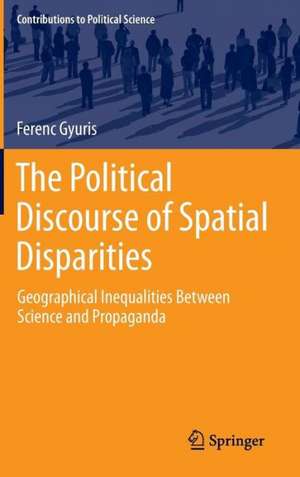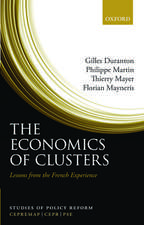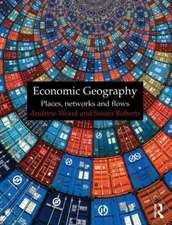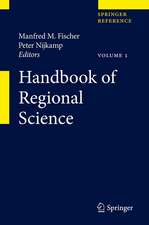The Political Discourse of Spatial Disparities: Geographical Inequalities Between Science and Propaganda: Contributions to Political Science
Autor Ferenc Gyurisen Limba Engleză Hardback – 13 noi 2013
| Toate formatele și edițiile | Preț | Express |
|---|---|---|
| Paperback (1) | 569.30 lei 38-44 zile | |
| Springer International Publishing – 23 aug 2016 | 569.30 lei 38-44 zile | |
| Hardback (1) | 651.84 lei 6-8 săpt. | |
| Springer International Publishing – 13 noi 2013 | 651.84 lei 6-8 săpt. |
Din seria Contributions to Political Science
- 18%
 Preț: 724.17 lei
Preț: 724.17 lei - 24%
 Preț: 633.39 lei
Preț: 633.39 lei - 17%
 Preț: 524.54 lei
Preț: 524.54 lei - 15%
 Preț: 583.61 lei
Preț: 583.61 lei -
 Preț: 380.63 lei
Preț: 380.63 lei - 15%
 Preț: 471.69 lei
Preț: 471.69 lei - 18%
 Preț: 780.82 lei
Preț: 780.82 lei - 18%
 Preț: 785.86 lei
Preț: 785.86 lei -
 Preț: 379.86 lei
Preț: 379.86 lei - 15%
 Preț: 695.85 lei
Preț: 695.85 lei -
 Preț: 390.84 lei
Preț: 390.84 lei - 18%
 Preț: 777.50 lei
Preț: 777.50 lei -
 Preț: 387.75 lei
Preț: 387.75 lei - 18%
 Preț: 791.71 lei
Preț: 791.71 lei -
 Preț: 394.29 lei
Preț: 394.29 lei - 15%
 Preț: 635.15 lei
Preț: 635.15 lei -
 Preț: 381.42 lei
Preț: 381.42 lei - 18%
 Preț: 798.66 lei
Preț: 798.66 lei -
 Preț: 392.37 lei
Preț: 392.37 lei -
 Preț: 391.02 lei
Preț: 391.02 lei -
 Preț: 359.76 lei
Preț: 359.76 lei - 18%
 Preț: 788.90 lei
Preț: 788.90 lei -
 Preț: 387.58 lei
Preț: 387.58 lei -
 Preț: 395.47 lei
Preț: 395.47 lei - 20%
 Preț: 579.41 lei
Preț: 579.41 lei - 15%
 Preț: 643.34 lei
Preț: 643.34 lei -
 Preț: 384.86 lei
Preț: 384.86 lei -
 Preț: 487.57 lei
Preț: 487.57 lei - 18%
 Preț: 781.62 lei
Preț: 781.62 lei - 18%
 Preț: 734.09 lei
Preț: 734.09 lei - 15%
 Preț: 645.79 lei
Preț: 645.79 lei - 15%
 Preț: 698.62 lei
Preț: 698.62 lei -
 Preț: 396.62 lei
Preț: 396.62 lei - 15%
 Preț: 584.26 lei
Preț: 584.26 lei - 18%
 Preț: 727.80 lei
Preț: 727.80 lei -
 Preț: 393.35 lei
Preț: 393.35 lei
Preț: 651.84 lei
Preț vechi: 766.87 lei
-15% Nou
Puncte Express: 978
Preț estimativ în valută:
124.73€ • 130.58$ • 103.21£
124.73€ • 130.58$ • 103.21£
Carte tipărită la comandă
Livrare economică 05-19 aprilie
Preluare comenzi: 021 569.72.76
Specificații
ISBN-13: 9783319015071
ISBN-10: 3319015079
Pagini: 400
Ilustrații: XV, 381 p. 41 illus.
Dimensiuni: 155 x 235 x 27 mm
Greutate: 0.74 kg
Ediția:2014
Editura: Springer International Publishing
Colecția Springer
Seria Contributions to Political Science
Locul publicării:Cham, Switzerland
ISBN-10: 3319015079
Pagini: 400
Ilustrații: XV, 381 p. 41 illus.
Dimensiuni: 155 x 235 x 27 mm
Greutate: 0.74 kg
Ediția:2014
Editura: Springer International Publishing
Colecția Springer
Seria Contributions to Political Science
Locul publicării:Cham, Switzerland
Public țintă
ResearchCuprins
Introduction.- The Debate Over Social Disparities and the Disparity Discourse.- Social Disparities Meet Space and Concepts Surrounding It.- A Contextual Analysis of the Emergence of Spatial Disparity Research.- Spatial Disparity Analysis and Anti-Capitalism: The "Classical" Marxist Tradition.- Non-Marxist Reactions to the Marxist Problematizations of Spatial Unevenness.- Spatial Disparity Research After the Initial Decades of Cold War: End of the "Golden Age".- And Yet Spatial Disparity is a Problem of Capitalism: Leftist Approaches in a Post-Fordist World.- Political Functioning of the Spatial Disparity Discourse: A summary.- Conclusion.- What to Do with the Discourse on Spatial Disparities? A normative Outlook.- References.
Notă biografică
Ferenc Gyuris, born in 1985, studied Geography at Eötvös Loránd University in Budapest, Hungary, where he obtained his degree in 2008. He earned his PhD in Geography at the University of Heidelberg in 2012. He works as Assistant Professor at the Department of Regional Science at Eötvös Loránd University. His interests embrace spatial disparities, the production of knowledge, and the geographies of communism and post-communist transition. In these issues he is the author of several papers published in English, Hungarian, Chinese, and Russian.
Textul de pe ultima copertă
This work aims to provide unique insights into the multidisciplinary research on spatial disparities from an unconventional point of view. It breaks with the conventional narrative that tends to interpret this theoretical tradition as a series of factual contributions to a better understanding of the issue. Instead, related theories are investigated in their political, economic, and social contexts, and spatial disparity research is presented as a political discourse. The book reveals how the propagandistic problematization or de-problematization of geographical inequalities serves the substantiation of political goals, while taking advantage of the legitimate authority of science and the image of scientific objectivity. It also explains how the discourse has functioned from 19th century social physics over the Cold War period up to Marxist geographies of the current neoliberal age, and in what way and to what extent political considerations prevent related concepts producing ‘objective’ knowledge about the complex phenomenon of spatial inequalities.
Caracteristici
Gives a comprehensive analysis of theories explaining spatial disparities The first attempt to let readers see spatial disparity research as political discourse Reveals the political bias and analytical usability of theoretical concepts Embeds technocratic concepts in their Cold War context to make their constraints visible for readers The first work to test Harvey’s uneven development concept on ‘real existing socialism’ Includes supplementary material: sn.pub/extras















